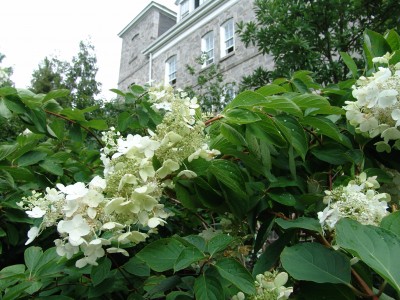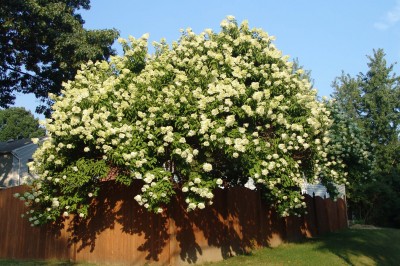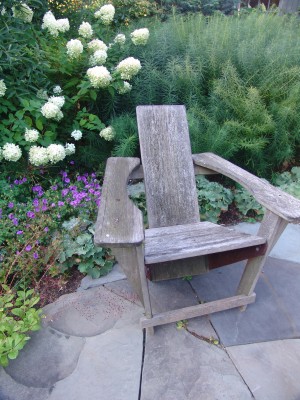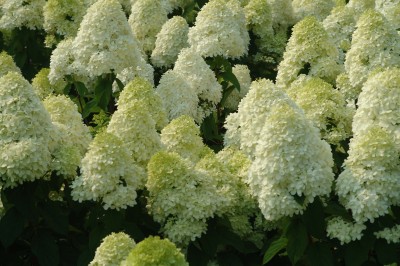Hydrangea paniculata
August is perhaps the most challenging of all the months during the growing season for the home gardener. Perennial and annual gardens alike look tired and overgrown and many flowering shrubs and trees have finished flowering for the season. However, this time of the year is the heyday for the panicle hydrangea, Hydrangea paniculata.
For years there were very few selections of Hydrangea paniculata available to home gardeners. Generally, the peegee hydrangea was ubiquitously planted in cemeteries and home gardens. Today there are dozens of choices of cultivars of Hydrangea paniculata including diminutive cultivars, pink forms, early blooming and late blooming selections, but the peegee hydrangea, Hydrangea paniculata ‘Grandiflora’ remains one of my favorites.
Like all Hydrangea paniculata selections, ‘Grandiflora’ can either be pruned hard in the winter and maintained as a shrub or it can be allowed to grow into a very large shrub reaching up to 25 feet tall. It can also be grown as a standard, where a single stem is selected and all the growth and flowering sits atop a single stout stem.
From August and into September Hydrangea paniculata ‘Grandiflora’ is covered in 1-foot long conical flower heads. Each individual flower has four pure white floral bracts. This hydrangea should be planted in full sun for best flowering to occur.
In addition to Hydrangea paniculata ‘Grandiflora’, I also love the new introduction called ‘Limelight’. The flowering time and size of flowers are very similar to ‘Grandiflora’, however as the new flowers emerge they are a beautiful lime-green which can really brighten a garden as the sun sets. As the flowers mature they too become massive heads of pure white flowers.
Without a doubt these are two of the most ornamental shrubs for late summer. Both cultivars have a long bloom time and as the flowers fade they take on casts of burgundy and pink and eventually become tawny brown adding interest to both the fall and winter landscape.









Jon
Posted at 00:20h, 26 OctoberFloribunda is much more showy.
charlotte s. holtvedt
Posted at 06:47h, 23 Mayi am interested in purchasing a “limelight” hydrangea paniculata. please advise where i can find these plants. i live in the greenville, n.c. region.
charlotte holtvedt
Andrew Bunting
Posted at 07:50h, 25 MayFor Hydrangea paniculata ‘Limelight’ try:
http://www.hydrangea.com/
Jim
Posted at 14:30h, 17 JuneHi: I think you’ve done a nice job on this presentation of the Limelight Hydrangea. I just planted one this very day. I had a Pee Gee Hydrangea Standard for the last 3 years, but something caused it to not leaf out this year. When I pulled it from the soil. the rootball was totally dead. Like I said the tree had been in the ground only 3 years. Very disappointing as I love these trees. Anyway not to belabour the point. Please keep up the ngood work. I will say fantastic job on your presentation!
Kindest regards: Jim Booker
Andrew Bunting
Posted at 09:15h, 18 JuneJim,
It is hard to say why your hydrangea died, but it sounds like root rot. If your plant did not have good drainage then the problem might have become worse with all the melting snow this spring.
Andrew Bunting, Curator
Scott Arboretum
GINAMARIE
Posted at 10:28h, 30 JulyOMG I HAVE SEVERAL OF THESE THAT I PLANTED ON MY NEW PROPERTY..AND I LOVE THEM EVEN HUBBY IS IN LOVE WITH THEM..THE BLOOMS ARE MASSIVE AND STRONG AND FULL OF PEDALS..LOOKING FORWARD TO ADD MORE AS THE YRS GO. I POST ON MY FB PAGE SO COME & TAKE A PEEK
Debbie
Posted at 22:02h, 30 AprilI would like to purchase some limelight hydrangeas but am having a difficult time finding them locally. I live in Spartanburg, S.C. Can you tell me where I could buy these? Thank you!
Andrew Bunting
Posted at 19:37h, 02 MayBluestone Perennials lists it: http://www.bluestoneperennials.com
luis_pr
Posted at 03:38h, 02 JanuaryHappy New Year Andrew. On your 2008 blog/article about hydrangea paniculatas, you stated that “Today there are dozens of choices of cultivars of Hydrangea paniculata including diminutive cultivars, pink forms, early blooming and late blooming selections”.
Nowadays, I see too many panics classified as early bloomers: Bombshell, Fire and Ice, Praecox, Quick Fire, and Unique. Seems as if the nurseries like to slap ‘early bloomer’ to almost all paniculatas. Which ones would you consider to be the earliest blooming from what is on the market nowadays?
I have the similar (sort of) problem with late blooming paniculatas. When I see a list of late blooming ones, the list is: Tardiva. That’s it. Zip. Period. No others. Gee, really? Would you know of any others or is Tardiva really “it” still?
TIA, Luis
Andrew Bunting
Posted at 08:57h, 02 JanuaryLuis,
I have not done a full assessment of the blooming times of Hydrangea paniculata cultivars. We, however, have been pleased with ‘Dharuma’, which is very compact and early flowering.
Andrew Bunting, Curator
DARSHAN AMIN
Posted at 09:22h, 27 JanuaryI representing non profit organization named VRAN in PA. I love Hydrangea paniculata as small TREE height 15′ +(-) white plowers through summar and added beauty in winter. I would like to buy in sum quantity. Can you please let me know where can I find healty plant of both variety. Thanks
Andrew Bunting
Posted at 20:33h, 28 JanuaryTry Wilkerson Mill Gardens: http://www.hydrangeas.com
Andrew Bunting
Posted at 20:33h, 28 JanuaryI would suggest Wilkerson Mill Gardens: http://www.hydrangea.com
Perfect Plants
Posted at 16:36h, 14 SeptemberThese are one of my favorite plants! Love the gorgeous blooms!
Becky Robert
Posted at 12:16h, 17 SeptemberIt is one of our favorites too! I hope you enjoyed lovely blooms this year.
Sincerely,
Becky Robert
Scott Arboretum